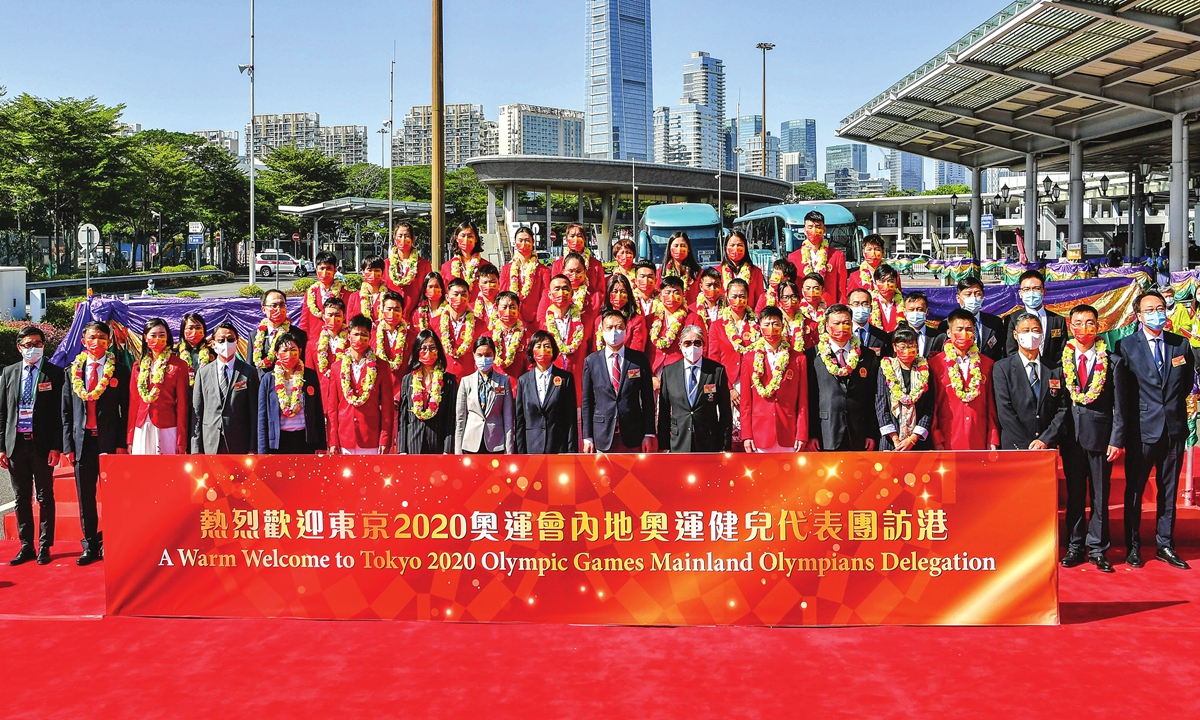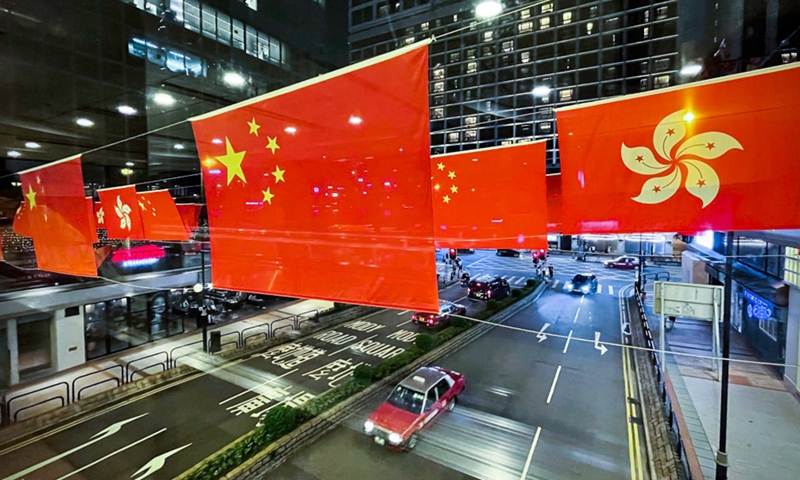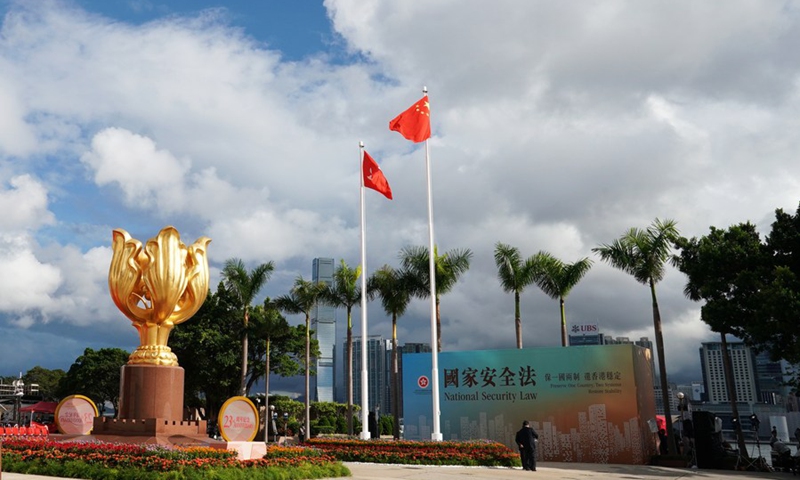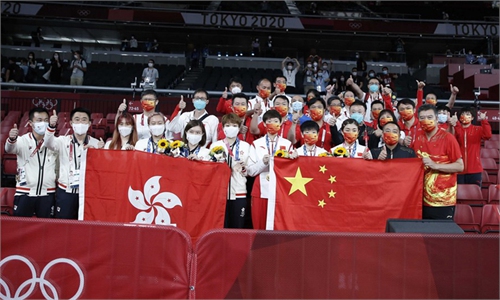Team China Olympic heroes inspire national pride in HK as Lam welcomes ‘favorable environment’ for unleashing patriotism

The all-star Olympic delegation of 29 Team China athletes arrives in Hong Kong and takes a group photo at the welcome ceremony on December 3, 2021. Photo: VCG
As many in Hong Kong warmly welcomed the visit of Chinese athletes - the tickets to see their activities were sold out within hours last week - public enthusiasm has become more palpable, as the COVID-19 epidemic had cut off frequent exchanges between the mainland and Hong Kong for too long, and more importantly, the overall political and social environment in the city has gradually but steadily changed in which the central government's message can be clearly conveyed to the Hong Kong public without being interfered by hostile external and radical opposition forces.
The social turmoil in Hong Kong in 2019 exposed severe loopholes in local governance and the lack of education among Hong Kong youth on national identity awareness. The latest activities, which also attracted many young people in the city, were seen as a major way of arousing public awareness for recognition of the country, while officials and policy advisors highlighted the importance of further advancing national education and civic values.

Photo:Pengpai
Highly expected tour
A welcome ceremony was held on Friday at the Shenzhen Bay Port where Secretary for Home Affairs Caspar Tsui and Timothy Fok Tsun-ting, president of the Sports Federation and Olympic Committee of Hong Kong Special Administrative Region, met the athletes including 28 Olympic gold medalists and sprinter Su Bingtian, in addition to three coaches for swimming, weightlifting and rowing.
The delegation is scheduled to present a series of performances on Saturday including badminton, fencing, gymnastics and table tennis, and some athletes such as table tennis player Ma Long and fencer Sun Yiwen will visit the Hong Kong Polytechnic University on Sunday morning.
China ranked second in the medal count behind the US with 38 gold, 32 silver and 18 bronze medals at Tokyo 2020. And the team of Hong Kong SAR collected six medals, making it "the greatest game ever," as some media reports said, and local athletes like "fencing god" Edgar Cheung Ka-long also made history by winning the city's first gold medal in 25 years.
Public enthusiasm for the Chinese Olympians was also unprecedented, as the 5,300 tickets to view the Olympic stars were sold out within three hours on November 26, and many residents expressed regret for failing to get a ticket, although they understood the concern of epidemic prevention and control.
"It's a tradition for the national Olympic delegation to visit Hong Kong after the Games, which has always been welcomed by the Hong Kong public… The majority of Hong Kong people are patriotic, but such patriotism was affected as we did not properly implement patriotic education since the city's return to the motherland," Lam told the Global Times on Friday.
With the implementation of the national security law for Hong Kong and the electoral reform, the practice of "one country, two systems" is now back to the correct path in Hong Kong. Patriotic behavior won't be affected by the instigation of the opposition groups or illegal activities, which will help people express their respect more for the country, Lam said.
In recent months, taikonauts on board China's Tianhe space station core module delivered a special virtual tour to nearly 300 youths from Hong Kong via an Earth-space video conference in early September, after a star team led by top space experts visited local universities and lunar soil brought back by the Chang'e-5 lunar probe was exhibited in the city in summer. All those activities have been highlighted by local media and welcomed by students. For some of them, it was also the first time to learn about the progress the country has made in scientific exploration.
The Chinese mainland's Korean War-themed blockbuster The Battle at Lake Changjin also drew tremendous popularity among the local communities, especially the youth in Hong Kong. For example, tickets were immediately sold out in the first weekend since it was screened in the city on November 11.
Hung Kam-in, a former member of the Kwun Tong District Council and convener of a think tank in Hong Kong, told the Global Times on Friday that some residents in his community who did not win tickets said they wish these athletes could show up in more public places so that they could get close to them and learn more about China's sports spirit.
He said more of such activities should be organized and conducted in Hong Kong, especially in elementary and middle schools, as face-to-face communication is a better way for Hong Kong's younger generation to deepen their understanding about the country and enhance their awareness of national identity.
Hong Kong people's sense of alienation to the county rose during the 2014 Occupy Central Movement which sparked a strong wave of anti-China sentiment among some youths, but the national security law for Hong Kong successfully "filled the gap" of "feeling far away" from the country, Hung said.
Some athletes also shared their feelings about the visit on Friday. Among them, Su, the 100 meter sprint Asian record holder, told a press conference after arriving in Hong Kong that he grew up watching Hong Kong's TV programs and wished that athletes' spirit of hard work and perseverance would inspire Hong Kong youth to be responsible and motivated.
Chinese Olympians visiting the city after the Olympic Games in the past reflects the central government cares for Hong Kong, Lam told a press conference on Friday. Due to the epidemic, the athletes could not visit more places this time, she said, noting that they could visit Hong Kong more frequently in the future after the resumption of cross-border exchanges between the mainland and Hong Kong.

Photo taken on July 1, 2020, shows Golden Bauhinia Square in Hong Kong, China. Photo: Xinhua
Changed soil
Since the return of Hong Kong to the motherland, Olympic athletes' visits to Hong Kong have been a task of great significance and solidarity, and have been deeply welcomed by Hong Kong people. The visits reflected the central government's unswerving support for Hong Kong's economic and social development, said So Ching-tung, chairman of the Federation of Jinjiang Hong Kong Associations Limited, where the Olympians are scheduled to visit on Sunday.
Compared with the months-long anti-government movement that turned into black-clad riots in 2019, today's Hong Kong society is stable and peaceful. Although it's not the first time for Olympians to visit the city, it is unprecedented that the city has embraced a new environment favorable for advancing national identity and patriotic education.
"Those taikonauts and athletes are national heroes, and their visits have nothing to do with politics, which could more easily arouse cordial feelings between local residents in Hong Kong and those in the mainland," Lau Siu-kai, vice president of the Chinese Association of Hong Kong and Macao Studies, told the Global Times on Friday.
When national team athletes visited the city before, some anti-government media outlets tried to play down their visits, a way of interfering or misinterpreting the message conveyed by the central government to the locals, Lau noted. While major radical opposition forces remained low profile in this new environment, it's important to grab the opportunity to highlight those activities to enhance national awareness among the Hong Kong public, he said.
Besides various activities in Hong Kong like space exploration and sports communication, Hong Kong schools are also required to infuse civic values to bolster students' national identity, an extremely important work in the eyes of Lam. But she said local authorities failed to do it well in the past.
"Without proper patriotic education, some Hong Kong young people were opposed to the central government and had an anti-mainland sentiment," Lam told the Global Times. Lam also stressed that she is willing to take more time to communicate with the education sector in the future as it's extremely important for the youth to learn "one country, two systems," the Constitution, and the national security law.
Further efforts are needed to address media reform, although Hong Kong's media have shown positive changes after the shutdown of Apple Daily, Hung said, noting that journalists' professional ethics and credibility as well as rules to regulate journalists have to be further strengthened. The first thing is to reform the Hong Kong Journalists Association which is not a professional organization on journalism.



